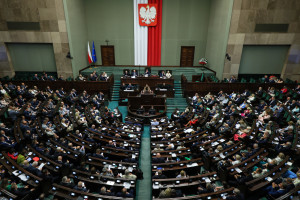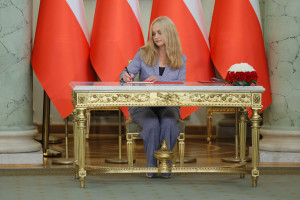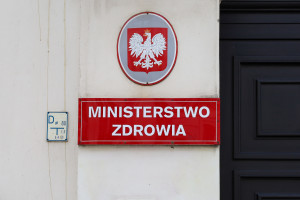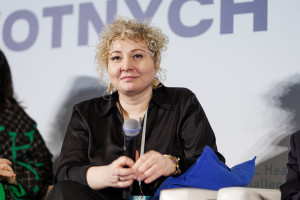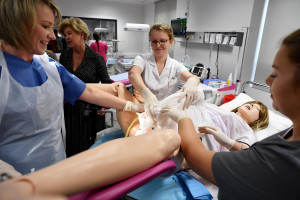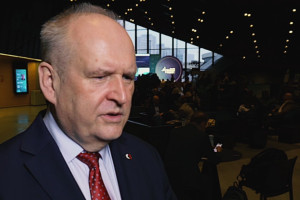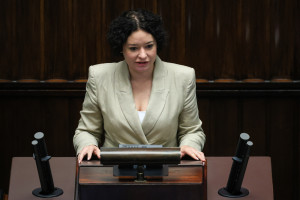"The entire ministry has been depoliticized." Did Tusk announce the replacement of all deputy ministers?

- Jolanta Sobierańska-Grenda replaced Izabela Leszczyna as head of the Ministry of Health. On Thursday, the president appointed new ministers.
- - The entire Ministry of Health will be de-partisanized and de-politicized - announced Prime Minister Donald Tusk , announcing on Wednesday changes in the composition of the Council of Ministers
- "In the coming days, this ministry will be handed over exclusively to management experts. And the sole goal will not be to improve the situation of doctors, but to improve the situation of patients," the Prime Minister added.
- He thanked his coalition partners for "taking note," even though it wasn't easy for them. Currently, all of them have representatives in the Ministry of Health.
- This raises the question whether this means that all deputy ministers can expect to be dismissed.
- In the current composition of the ministry's management, there have been numerous frictions resulting from differences in the political views of deputy ministers from coalition parties.
Prime Minister Donald Tusk announced that the Ministry of Health will "be handed over to management experts" in the coming days. "I thank the coalition partners for accepting this. It wasn't easy for them to have the entire ministry decoupled from partisan politics," he noted.
At the same time, he stressed that today we need a ministry "that is complete, dedicated exclusively to substantive work."
- The entire ministry will be departisanized and depoliticized - he announced.
On Thursday afternoon, there was an official change in the position of Minister of Health - Jolanta Sobierańska-Grenda has been in her new role since Friday.
What will happen to the deputy ministers who remained in the Ministry of Health leadership? Can they expect dismissal? What exactly did Prime Minister Donald Tusk's announcement mean? There have been no official decisions regarding changes in the ministry's leadership at this time.
According to unofficial information from the Health Market, all deputy ministers except Katarzyna Kacperczyk are to be dismissed. The latter has no political ties to the coalition partners, but is needed in the ministry due to the KPO (National Health Organisation) and her involvement in negotiations on this issue at the EU level. This is especially true if the hospital reform fails to pass— and all indications are that after the government passed it the fourth time, it failed to secure a majority in the Sejm —plan B will have to be implemented—as it was one of the KPO's so-called milestones.
The fact that the cooperation between coalition deputy ministers appointed by PSL, Poland 2050, or the Left with the previous head of the ministry was not going well at times, among other things due to differences in political views, was heard more than once, for example during work on the project on in vitro fertilization or the hospital reform, the reduction of health insurance contributions for entrepreneurs, as well as Izabela Leszczyna's actions regarding easier access to the "morning-after pill" or guidelines on legal termination of pregnancy in certain cases.
Let us recall that the following persons remained in the ministry as deputy ministers: Marek Kos, Wojciech Konieczny, Urszula Demkow, Jerzy Szafranowicz , and the aforementioned Katarzyna Kacperczyk.
We have learned unofficially that no documents have been handed over to anyone yet, and any decisions will be made after a meeting with the new minister, most likely at the beginning of next week.
For now, only a welcoming ceremony with Jolanta Sobierańska-Grenda has taken place, and her deputies claim that they are focusing on current work, including in the Sejm and the Chancellery of the Prime Minister, of which there is no shortage this week.
Wojciech Konieczny - a fifth column in the government?Although he was the only secretary of state rather than an undersecretary—so in theory, his position among the deputy ministers, as first deputy minister, was the highest—he was more of an outsider in the ministry. He represented the Left , combined the position of deputy minister with a senatorial mandate, and sometimes seemed to oscillate between these roles. He primarily acted as deputy minister of health, but he often stated that he spoke as a representative of the Left or as a senator.
As a representative of the Left, he blocked the first version of the hospital reform. As a senator, he opposed lowering health insurance contributions for entrepreneurs. However, as a member of the coalition government, he did not participate in the vote. He explained that this was a situation in which one could not shirk responsibility and vote against one's own government , because then, to be consistent, one would have to withdraw from it.
He didn't hide the fact that the Left party had its own, completely different idea for reforming the healthcare system than the government's. First, the reform should move toward a budget-based system: a health tax instead of a contribution. Second, all hospitals in a given voivodeship should have a single owner – the marshal. Third, the payroll fund should be separated from the rest of the funding for medical facility operations. This should be followed by realigned wages and employment standards.
"I say what I think, always more or less the same," he once stated at a health committee meeting. And he is indeed known for not beating around the bush. An example? "What we saw this year: the fight to lower health insurance contributions, while at the same time the National Health Fund budget for this year is not approved, is a breakdown of some basic logic," he said recently on Polish Radio.
Although he believes that healthcare reform without hospital reform is doomed to failure, he was the one who blocked its first version.
"If this project aimed to improve the situation of hospitals, but also shorten waiting times and improve working conditions for staff, I would certainly support this reform. However, it included provisions that we, as the Left, could not accept, namely the large-scale commercialization of hospitals ," he explained to Rynek Zdrowia.
A few months ago, when asked about his political ambitions, he replied that he was satisfied with his position, although he had one ambition: to be more effective.
He comes from Częstochowa, just like Izabela Leszczyna. He is a neurologist and has headed the Municipal Hospital in Częstochowa since 2013. He is currently serving his second term as senator.
In 2001, he won the Polish Doctors' Basketball Championship. He is a member of the Polish Socialist Party and serves as chairman of its Supreme Council.
Marek Kos - Deputy Minister of MedicinesHe is a surgeon, an expert in public health and healthcare management. He is a deputy minister appointed by the Polish People's Party (PSL). He is a councilor of the Lublin Voivodeship Assembly.
He became Undersecretary of State in the Ministry of Health on 4 January 2024, and from 24 June last year he was responsible, among others, for the Department of Drug Policy and Pharmacy, i.e. the drug reimbursement process and drug policy.
He was involved in the project of the so-called quick amendment to the Reimbursement Act (SZNUR) concerning medicines.
He gained notoriety earlier this year when Gazeta Wyborcza wrote about the " rapid rise of his scientific career" and his ability to combine work at the ministry with research in a completely new field . However, these reports did not cause him to leave the ministry. In an interview with Rynek Zdrowia in March of this year, he denied allegations of a potential conflict of interest in his habilitation.
When asked about the SZNUR project, he stated that he had no concerns about a political blockade in this respect, and that he was "only afraid of the Ministry of Finance".
In May of this year, he presented the long-awaited draft amendment to the Reimbursement Act, which was hailed as a broad, no longer quick, amendment, and is intended, among other things, to speed up reimbursement processes and involve patients more closely.
When it comes to the list of reimbursed drugs, it was difficult to keep up with his predecessor, Maciej Miłkowski, in terms of the number of new molecules reimbursed. However, Marek Kos tried to maintain a similar level and introduced a number of new therapies in subsequent announcements.
As deputy minister for drug policy, Marek Kos was also responsible for preparing a list of critical drugs, and in December 2024 such a list with 301 items was announced, and on July 15 this year it was updated and expanded - it included 401 substances .
Jerzy Szafranowicz - deputy minister of the failed hospital reformHe was appointed to the ministry at the beginning of July last year as a candidate of Minister Izabela Leszczyna.
This is a deputy minister who had difficult sections in his remit, as he piloted the hospital reform, explained the finances of the National Health Fund, and was exposed to difficult talks in the tripartite team for health care, including changes to the law on minimum wages in health care.
"Minister Kacperczyk and I were not party representatives in the ministry. Nevertheless, it's difficult to predict what will happen in the near future. I fully submit to the decision of the new minister, who has the right to choose her colleagues with whom she will want to form the Ministry of Health," Jerzy Szafranowicz told Rynek Zdrowia on Wednesday, after the prime minister announced the cabinet reshuffle.
Since he is responsible for implementing the hospital reform currently underway in parliament, one might assume he would at least be able to see the bill through to its finalization, leading to its passage. However, on Friday , during the second reading of the hospital reform bill, the opposition announced it would vote against it . The coalition partner, the Left, will also not support the bill. Therefore, the bill may not meet the majority requirement for passage.
On the other hand, the new minister is known for implementing numerous hospital consolidations, which is one of the main goals of the reform currently being implemented. She didn't do these consolidations alone, so she certainly has people among her current colleagues to whom she could entrust such responsibilities within the ministry.
Katarzyna Kacperczyk - unblocked funds from the KPOShe was appointed Deputy Minister of Health at the end of January 2024. She is a long-time public servant with experience in international cooperation and supporting economic and investment cooperation.
Previously, in Donald Tusk's previous government from 2013 to 2016, she served as Deputy Minister of Foreign Affairs. Her responsibilities included responsibility for Poland's economic diplomacy. She had been employed at the Ministry of Foreign Affairs since 2002.
From her first days in office, one of her main responsibilities at the Ministry of Health was to unlock funds from the National Recovery Plan for Poland. This amounted to PLN 18 billion.
She successfully negotiated project changes and implementation delays so that Poland could begin benefiting from billions of złoty for health care as quickly as possible. In July of last year, she announced that the Revision of the National Recovery Plan regarding health care had been approved by the European Commission with "minor adjustments."
During this year's European Economic Congress in April in Katowice, Katarzyna Kacperczyk spoke about the first allocation of nearly PLN 10 billion for investments in the healthcare sector, mainly in hospitals, as well as about subsequent calls for proposals for funds from the KPO.
She also played a crucial role during the Polish EU Presidency in the first half of this year. In June , she announced the success of the Polish Presidency: the conclusion of nearly two years of negotiations on the pharmaceutical package . This is expected to result in the first revision of EU pharmaceutical law in 20 years . According to Katarzyna Kacperczyk, it is also crucial that health is recognized as the foundation of EU security, not just one of its components.
As she emphasized, the issue of children's and youth mental health in the context of new digital challenges has also been permanently placed on the European Commission and EU agenda.
Urszula Demkow - doctor and diagnostician with the title of professorAn excellent specialist in her field, who is completely unsuitable for the position of deputy minister - such opinions could often be heard about Professor Urszula Demkow.
When she spoke on rare diseases, genetics, and laboratory tests , it was clear she was a highly qualified expert. However, when it came to confronting various interest groups and responding to difficult demands, she fared much worse.
At the ministry, she worked on, among other things , the Rare Diseases Act, the history of which dates back to previous governments, so it was a mission that was one of the more difficult ones.
At the very beginning of her tenure at the Ministry of Health, she caused a stir by appointing a new psychotherapy consultant—reportedly without consulting Izabela Leszczyna. In mid-December 2023, Renata Mizerska, president of the Polish Psychotherapy Council, was appointed as the first-ever national psychotherapy consultant. On February 26, 2024 , Professor Wiesław Cubała's name appeared on the list of consultants in Mizerska's place, but he was dismissed by the Ministry of Health two days later. It was explained that his appointment was improper. As a result, Urszula Demkow lost her supervision of the Department of Medical Personnel Development. She regained it after several months.
The deputy minister also "made a slip-up" in rather difficult circumstances: after the death of a paramedic in Siedlce, attacked by an aggressive patient. On Radio dla Ciebie, she said, among other things, that paramedics could work shorter hours, and that the paramedic murdered in Siedlce, who was 62 years old, was already of retirement age and "it was his choice." This statement was not only awkward but also untrue, as paramedics are not entitled to early retirement. She demonstrated both a lack of sensitivity and a lack of knowledge of the regulations.
Urszula Demkow almost immediately apologized for her words to the entire paramedic community and the family of the deceased after the brutal attack. "I myself am part of the medical community, also with experience working in emergency medical teams, and I assure you that I will make every effort to ensure dignity, respect, and gratitude for all those who save our health and lives," she wrote in a statement.
Professor Demkow is affiliated with Szymon Hołownia's Polska 2050 party and was appointed deputy minister by that group. She is a professor of medical sciences specializing in immunology, affiliated with the Faculty of Medicine at the Medical University of Warsaw. She heads the Department of Laboratory Diagnostics and Clinical Immunology of Developmental Age. She specializes in internal medicine (second degree), immunology, allergology, and laboratory diagnostics.
Copyrighted material - reprint rules are specified in the regulations .
rynekzdrowia


